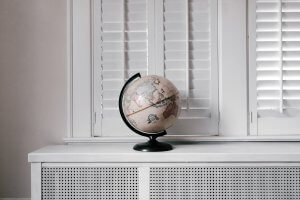- UK/USA Tax & estate planning
- International trusts, tax and estate planning

Longer Reads
How the US and UK tax systems work together
Associate Aidan Grant looks at how the US and UK tax systems work for US residents living in the UK, in his recent article in FT Adviser.
5 minute read
Published 16 March 2021
Key information
Unlike most other jurisdictions worldwide, the US levies tax on its citizens irrespective of whether they live in the US.
This means that a UK resident US citizen is often exposed to both US and UK tax simultaneously.
The extent to which that individual’s wealth outside the UK is exposed to UK tax depends in part on whether that individual is either UK domiciled (that is, they consider the UK to be their ultimate, permanent home) or deemed domiciled (that is, they are not actually UK domiciled but, because of the individual’s circumstances, the UK will treat them as if they are UK domiciled).
This different approach results in UK resident US citizens often being exposed to tax in both jurisdictions at the same time.
If that individual wants to avoid that double taxation then, unless they are eligible to claim a foreign tax credit in one jurisdiction for tax paid in the other (which is permissible in certain circumstances), they may decide to leave the UK. However, exposure to UK tax does not stop as soon as the individual ceases to be UK resident.
What tax does a UK resident US citizen pay?
Income tax and capital gains tax
A UK resident US citizen (“P”) is, by default, subject to UK tax on their worldwide income and gains, known as the ‘arising basis’ of taxation. However, if P is neither UK domiciled nor deemed domiciled, then they are eligible to be taxed on the ‘remittance basis’ of taxation.
This means that P only suffers UK tax on UK income and gains, or on foreign income and gains that are ‘remitted’ to (that is, brought into or used in) the UK by, or for the benefit of, P or a ‘relevant person’ – a class that would include P’s spouse and minor children.
The remittance basis can be very efficient if an individual has significant foreign income and gains that they wish to shield from UK tax. However, since P is also a US citizen then those same funds will likely have also suffered US tax as they arose.
This means that P may be exposed to double taxation if they later bring those funds in the UK, that is, firstly to US tax when the funds initially arose, and then secondly to UK tax on the remittance of the funds.
P may be able to claim a foreign tax credit under the US/UK double tax treaty for the US tax already paid, however this is generally only available if the funds are remitted in the UK tax year in which the funds arise and, even then, usually only on certain categories of income and gains (such as those linked directly to US real estate and US dividends).
Given the above, P may be better off simply falling back on the default arising basis, since US and UK tax would both be levied as the funds arose and so the likelihood of obtaining a foreign tax credit is usually greater.
Additionally, once P has been UK resident for seven of the previous nine tax years, they must pay the annual remittance basis charge (starting at £30,000 and later rising to £60,000), further decreasing the potential efficiency of the remittance basis.
Inheritance tax
If P is either UK domiciled or deemed domiciled, then they are liable to IHT on their worldwide assets.
Conversely, if P is neither UK domiciled nor deemed domiciled then generally only their UK assets are exposed to IHT. In almost all cases P’s residency status is irrelevant for IHT purposes.
However, as a US citizen P’s worldwide assets are also exposed to US gift and estate tax. Where both jurisdictions would each levy tax, a foreign tax credit may be provided by the US/UK gift and estate tax treaty.
Whether a credit is available and which country retains primary taxing rights both depend on a number of factors, including the location of the taxed asset, whether P also holds UK citizenship and (if P is UK domiciled or deemed domiciled) to which country P has the closer ties.
That said, as a US citizen P currently has a US gift and estate tax lifetime allowance of $11.7m, and so it is only those individuals with estates in excess of this figure that realistically need be concerned about US gift or estate tax.
However, US citizens should be aware that the Biden administration has mooted cutting this allowance significantly, ahead of a statutory halving of the allowance in 2026 anyway. For this reason many US citizens are currently stuck in a ‘use it or lose it’ conundrum.
Leaving the UK
In order to explain how, why and when an individual ceases to be exposed to UK tax, it is useful to refer to a real-life example.
Here we can turn to two of the most high-profile individuals to leave the UK recently: the Duke and Duchess of Sussex, Harry and Meghan.
Income tax and CGT
Non-resident individuals are generally only liable to UK income tax on UK source income and on CGT on disposals of UK land (or companies holding UK land).
However, the UK has anti-avoidance rules broadly stating that if an individual leaves the UK for a period of fewer than five tax years, and while non-resident receives income or gains on which they pay no UK tax, that tax may be clawed back when they return.
Harry and Meghan should be aware therefore that a short secondment to the US would not be enough if they want to avoid these rules.
IHT
Matters become more complex with IHT due to the question of whether Harry and Meghan are still UK domiciled (or deemed domiciled) now that they have left the UK.
Domicile status is based on an individual’s intentions, but this is very difficult for the individual or HMRC to definitively prove one way or the other.
Where an individual might claim to be non-UK domiciled (because for example they have ceased to be UK resident), the UK authorities have given themselves the tools to retain individuals inside the UK tax net for a period of time through labelling individuals as deemed UK domicile.
How the domicile and deemed domicile rules apply to Harry and Meghan differ in a few important ways.
Meghan
Having returned to the US, Meghan might argue that she does not consider the UK her permanent home. Of course she may even argue she never intended to remain permanently in the UK (and thus she was never UK domiciled), although others might counter that making the UK one’s permanent home should be in the reasonable contemplation of anyone marrying a prince seventh in line to the throne.
- However, if Meghan never became UK domiciled then her departure from the UK is relatively straightforward. An individual must be UK resident for 15 out of the last 20 tax years to be considered a ‘long term resident’ deemed domiciliary in any given tax year. Therefore, if Meghan remains outside the UK for long enough this ‘clock’ will reset and she would have a further 15 years of UK residence before having to worry about becoming deemed UK domiciled. Of course, Meghan could always return with an intention to remain here permanently, giving her an actual UK domicile, in which case this would override the deemed domicile question.
- However if Meghan was actually UK domiciled at some point (but, we assume, she has since lost it), then she will remain deemed domiciled for three calendar years from the date that she lost her UK domicile status (a ‘lost domicile’ deemed domiciliary). This anti-avoidance rule prevents a UK domiciliary leaving the UK, declaring themselves non-domiciled and then promptly engaging in activities that would have otherwise incurred UK tax had they remained UK domiciled.
Harry
Harry poses an entirely different conundrum. Given that Harry’s grandmother, father and brother represent the current and next two monarchs, one might conclude that it would be difficult for Harry to ever claim that the UK is not his permanent home. Indeed, were Harry to claim to be non-domiciled this would likely trigger a fiscal and constitutional crisis.
However, if we imagine that Harry had indeed lost his UK domicile status, then he would be a ‘lost domicile’ deemed domiciliary and subject to the same three-calendar years rule as Meghan.
However, where HMRC’s treatment of Harry and Meghan would differ significantly would be upon their return to the UK. Unlike Meghan, who could restart her ’15 out of 20 years’ clock, Harry would be considered a ‘formerly domiciled resident’ deemed domiciliary.
This is because he is: (1) an individual born in the UK with a UK domicile of origin; (2) who moved overseas and acquired a new domicile; and then (3) becomes UK resident again. In those circumstances, upon resuming UK residence Harry would immediately become deemed domiciled for income tax and CGT purposes, and deemed domiciled for IHT purposes in the following tax year. As such, for the rest of his life Harry can only ever avoid the tax consequences of being a UK (deemed) domiciliary while he remains non-resident.
Of course, if Harry remains UK domiciled then discussion of his potential deemed domicile status is irrelevant.
Finally, it needs to be remembered that of course Harry is also moving out of the UK fire and into the US frying pan. Not only does Harry have to worry about the US federal tax rules, as a Californian he must now also contend with the high level of California state taxes. Even worse, the UK does not generally allow a foreign tax credit for US state taxes.
That said ‘the tax tail should never wag the dog’, and no one would ever reasonably conclude that Harry and Meghan’s relocation to the US was driven by tax concerns.
This article was first published in FT Adviser in March 2021.
Related content
Longer Reads
How the US and UK tax systems work together
Associate Aidan Grant looks at how the US and UK tax systems work for US residents living in the UK, in his recent article in FT Adviser.
Published 16 March 2021
Associated sectors / services
Authors
Unlike most other jurisdictions worldwide, the US levies tax on its citizens irrespective of whether they live in the US.
This means that a UK resident US citizen is often exposed to both US and UK tax simultaneously.
The extent to which that individual’s wealth outside the UK is exposed to UK tax depends in part on whether that individual is either UK domiciled (that is, they consider the UK to be their ultimate, permanent home) or deemed domiciled (that is, they are not actually UK domiciled but, because of the individual’s circumstances, the UK will treat them as if they are UK domiciled).
This different approach results in UK resident US citizens often being exposed to tax in both jurisdictions at the same time.
If that individual wants to avoid that double taxation then, unless they are eligible to claim a foreign tax credit in one jurisdiction for tax paid in the other (which is permissible in certain circumstances), they may decide to leave the UK. However, exposure to UK tax does not stop as soon as the individual ceases to be UK resident.
What tax does a UK resident US citizen pay?
Income tax and capital gains tax
A UK resident US citizen (“P”) is, by default, subject to UK tax on their worldwide income and gains, known as the ‘arising basis’ of taxation. However, if P is neither UK domiciled nor deemed domiciled, then they are eligible to be taxed on the ‘remittance basis’ of taxation.
This means that P only suffers UK tax on UK income and gains, or on foreign income and gains that are ‘remitted’ to (that is, brought into or used in) the UK by, or for the benefit of, P or a ‘relevant person’ – a class that would include P’s spouse and minor children.
The remittance basis can be very efficient if an individual has significant foreign income and gains that they wish to shield from UK tax. However, since P is also a US citizen then those same funds will likely have also suffered US tax as they arose.
This means that P may be exposed to double taxation if they later bring those funds in the UK, that is, firstly to US tax when the funds initially arose, and then secondly to UK tax on the remittance of the funds.
P may be able to claim a foreign tax credit under the US/UK double tax treaty for the US tax already paid, however this is generally only available if the funds are remitted in the UK tax year in which the funds arise and, even then, usually only on certain categories of income and gains (such as those linked directly to US real estate and US dividends).
Given the above, P may be better off simply falling back on the default arising basis, since US and UK tax would both be levied as the funds arose and so the likelihood of obtaining a foreign tax credit is usually greater.
Additionally, once P has been UK resident for seven of the previous nine tax years, they must pay the annual remittance basis charge (starting at £30,000 and later rising to £60,000), further decreasing the potential efficiency of the remittance basis.
Inheritance tax
If P is either UK domiciled or deemed domiciled, then they are liable to IHT on their worldwide assets.
Conversely, if P is neither UK domiciled nor deemed domiciled then generally only their UK assets are exposed to IHT. In almost all cases P’s residency status is irrelevant for IHT purposes.
However, as a US citizen P’s worldwide assets are also exposed to US gift and estate tax. Where both jurisdictions would each levy tax, a foreign tax credit may be provided by the US/UK gift and estate tax treaty.
Whether a credit is available and which country retains primary taxing rights both depend on a number of factors, including the location of the taxed asset, whether P also holds UK citizenship and (if P is UK domiciled or deemed domiciled) to which country P has the closer ties.
That said, as a US citizen P currently has a US gift and estate tax lifetime allowance of $11.7m, and so it is only those individuals with estates in excess of this figure that realistically need be concerned about US gift or estate tax.
However, US citizens should be aware that the Biden administration has mooted cutting this allowance significantly, ahead of a statutory halving of the allowance in 2026 anyway. For this reason many US citizens are currently stuck in a ‘use it or lose it’ conundrum.
Leaving the UK
In order to explain how, why and when an individual ceases to be exposed to UK tax, it is useful to refer to a real-life example.
Here we can turn to two of the most high-profile individuals to leave the UK recently: the Duke and Duchess of Sussex, Harry and Meghan.
Income tax and CGT
Non-resident individuals are generally only liable to UK income tax on UK source income and on CGT on disposals of UK land (or companies holding UK land).
However, the UK has anti-avoidance rules broadly stating that if an individual leaves the UK for a period of fewer than five tax years, and while non-resident receives income or gains on which they pay no UK tax, that tax may be clawed back when they return.
Harry and Meghan should be aware therefore that a short secondment to the US would not be enough if they want to avoid these rules.
IHT
Matters become more complex with IHT due to the question of whether Harry and Meghan are still UK domiciled (or deemed domiciled) now that they have left the UK.
Domicile status is based on an individual’s intentions, but this is very difficult for the individual or HMRC to definitively prove one way or the other.
Where an individual might claim to be non-UK domiciled (because for example they have ceased to be UK resident), the UK authorities have given themselves the tools to retain individuals inside the UK tax net for a period of time through labelling individuals as deemed UK domicile.
How the domicile and deemed domicile rules apply to Harry and Meghan differ in a few important ways.
Meghan
Having returned to the US, Meghan might argue that she does not consider the UK her permanent home. Of course she may even argue she never intended to remain permanently in the UK (and thus she was never UK domiciled), although others might counter that making the UK one’s permanent home should be in the reasonable contemplation of anyone marrying a prince seventh in line to the throne.
- However, if Meghan never became UK domiciled then her departure from the UK is relatively straightforward. An individual must be UK resident for 15 out of the last 20 tax years to be considered a ‘long term resident’ deemed domiciliary in any given tax year. Therefore, if Meghan remains outside the UK for long enough this ‘clock’ will reset and she would have a further 15 years of UK residence before having to worry about becoming deemed UK domiciled. Of course, Meghan could always return with an intention to remain here permanently, giving her an actual UK domicile, in which case this would override the deemed domicile question.
- However if Meghan was actually UK domiciled at some point (but, we assume, she has since lost it), then she will remain deemed domiciled for three calendar years from the date that she lost her UK domicile status (a ‘lost domicile’ deemed domiciliary). This anti-avoidance rule prevents a UK domiciliary leaving the UK, declaring themselves non-domiciled and then promptly engaging in activities that would have otherwise incurred UK tax had they remained UK domiciled.
Harry
Harry poses an entirely different conundrum. Given that Harry’s grandmother, father and brother represent the current and next two monarchs, one might conclude that it would be difficult for Harry to ever claim that the UK is not his permanent home. Indeed, were Harry to claim to be non-domiciled this would likely trigger a fiscal and constitutional crisis.
However, if we imagine that Harry had indeed lost his UK domicile status, then he would be a ‘lost domicile’ deemed domiciliary and subject to the same three-calendar years rule as Meghan.
However, where HMRC’s treatment of Harry and Meghan would differ significantly would be upon their return to the UK. Unlike Meghan, who could restart her ’15 out of 20 years’ clock, Harry would be considered a ‘formerly domiciled resident’ deemed domiciliary.
This is because he is: (1) an individual born in the UK with a UK domicile of origin; (2) who moved overseas and acquired a new domicile; and then (3) becomes UK resident again. In those circumstances, upon resuming UK residence Harry would immediately become deemed domiciled for income tax and CGT purposes, and deemed domiciled for IHT purposes in the following tax year. As such, for the rest of his life Harry can only ever avoid the tax consequences of being a UK (deemed) domiciliary while he remains non-resident.
Of course, if Harry remains UK domiciled then discussion of his potential deemed domicile status is irrelevant.
Finally, it needs to be remembered that of course Harry is also moving out of the UK fire and into the US frying pan. Not only does Harry have to worry about the US federal tax rules, as a Californian he must now also contend with the high level of California state taxes. Even worse, the UK does not generally allow a foreign tax credit for US state taxes.
That said ‘the tax tail should never wag the dog’, and no one would ever reasonably conclude that Harry and Meghan’s relocation to the US was driven by tax concerns.
This article was first published in FT Adviser in March 2021.
Associated sectors / services
- UK/USA Tax & estate planning
- International trusts, tax and estate planning
Authors
Need some more information? Make an enquiry below.
Subscribe
Please add your details and your areas of interest below
Article contributor
Aidan
GrantPartner
Specialising in International trusts, tax & estate planning, Private wealth, UK trusts, tax & estate planning and US/UK Tax & estate planning
Enjoy reading our articles? why not subscribe to notifications so you’ll never miss one?
Subscribe to our articlesMessage us on WhatsApp (calling not available)
Please note that Collyer Bristow provides this service during office hours for general information and enquiries only and that no legal or other professional advice will be provided over the WhatsApp platform. Please also note that if you choose to use this platform your personal data is likely to be processed outside the UK and EEA, including in the US. Appropriate legal or other professional opinion should be taken before taking or omitting to take any action in respect of any specific problem. Collyer Bristow LLP accepts no liability for any loss or damage which may arise from reliance on information provided. All information will be deleted immediately upon completion of a conversation.
Close







































